Poetry Society
How do Poets Use Language?
Why do writers choose the language they do? Here's a resource that has the poet himself answer that very question. Joseph Coelho explains why he chose the words and images he used in his poem, "If All the World Were Paper."
EngageNY
World Café to Analyze Theme and Character in A Long Walk to Water (Chapters 16–18)
Here comes a surprise ending! Readers discuss their thoughts about the ending of A Long Walk to Water by answering probing questions. They participate in a World Café where they work in triads to complete a chart and a prompt during...
EngageNY
World Café about Pygmalion
Round and round you go. Scholars participate in a World Cafe to discuss Pygmalion. As they circulate around to different groups, they talk about three main questions that pertain to the actions of Eliza and Higgins. After circulating,...
EngageNY
World Cafe: Analyzing Sojourner Truth’s “Ain’t I a Woman?”
May I take your order? Scholars read "Ain't I a Woman" and participate in a World Cafe. They work in small groups to discuss text-related questions and then complete a Note-Catcher sheet to organize their thoughts. For homework, learners...
EngageNY
Analyzing the Resolution of the Play: World Café Discussion
It's time to get active! Scholars participate in a World Café protocol to promote discussion and leadership. They leave their seats and move from group to group to discuss critical questions related to their read-aloud of Shakespeare's A...
EngageNY
Introducing the Struggle for Survival in the Introduction of World without Fish
No fish? Catch a word. Scholars read World without Fish and record unfamiliar vocabulary in their word catchers. They discuss word meanings as well as root words. They answer text-dependent questions before discussing the importance of...
EngageNY
Introducing World without Fish
One fish, two fish, red fish, no fish. Scholars analyze World without Fish to determine the gist, identify vocabulary, and answer text-dependent questions. As learners read, they use sticky notes to annotate the text. They also work in...
PBS
Symbolism and the Use of “New Language” in The Handmaid’s Tale
Words matter. Words frame thought. Words are symbolic. Readers of Margaret Atwood's The Handmaid's Tale examine how the words In Gilead's "New Language" reinforce the power of the government and provided insight into the symbolic level...
The New York Times
Evaluating Sources in a ‘Post-Truth’ World: Ideas for Teaching and Learning about Fake News
The framers of the United States Constitution felt a free press was so essential to a democracy that they granted the press the protection it needed to hold the powerful to account in the First Amendment. Today, digital natives need to...
EngageNY
Analyzing Language, Character, and Theme: World Café Discussion
As part of their study of A Midsummer Night's Dream, class members meet in a drama circle to discuss and role-play scenes from the play. They then engage in an activity called World Cafe, analyzing the characters' actions from the text....
EngageNY
World Café to Analyze Themes in To Kill a Mockingbird (Chapter 10)
Time for table discussions. Scholars once again take part in a World Cafe activity. They discuss chapter 10 of To Kill A Mockingbird in groups of four and rotate from table to table. At each table, they select a new leader. Readers then...
Azar Grammar
Song Lessons: What a Wonderful World
Here's a wonderful way to learn English grammar. Class members examine the plural count nouns in Thiele and Weiss's "What a Wonderful World," reading the lyrics as they listen to Louis Armstrong's version of this classic song.
TED-Ed
What is the World Wide Web?
Did you know that the World Wide Web and the Internet are not the same thing? Did you know that Tim Berners-Lee is considered the father of the Web? Networks, web servers, web hosts, website addresses, domain names, web languages,...
Avi Writer
The Cross of Lead, At the Edge of the World, and The End of Time
A fan of Ari's Crispin trilogy? Here is a packet that contains study guides for all three Crispin novels: The Cross of Lead, At the Edge of the World, and The End of Time.
Maryland Department of Education
The Concept of Diversity in World Literature Lesson 1: Unit Introduction
To launch a unit study of the concept of diversity in World Literature, class members compare Chinua Achebe's essay, "An Image of Africa: Racism in Conrad's Heart of Darkness" and Richard Rodriguez's essay, "The Chinese in All of Us: A...
ReadWriteThink
Defining Literacy in a Digital World
What skills are necessary to interact with different types of text? Twenty-first century learners live in a digital world and must develop a whole new set of skills to develop media literacy. Class members engage in a series of...
Maryland Department of Education
The Concept of Diversity in World Literature Lesson 13: Unit Culmination - Symposium
To conclude a unit on the concept of diversity in world literature, class members conduct a symposium on "African Literature in Global Perspectives." In order to earn a spot on the panel, individuals craft an original thesis that...
EngageNY
Paraphrasing and Evaluating Sources: “Gaming Can Make a Better World”
Explore how gaming might make the world a better place. To dissect the statement, scholars watch video clips about the benefits of video games. While listening, pupils make notes in their researcher's notebooks, attempting to discern the...
EngageNY
Mid-Unit Assessment: Analyzing Idea Development in Chapter 3 of World without Fish
Half way there. Scholars work on the mid unit assessment for World without Fish. Learners work independently to complete the assessment. They then answer text-dependent questions and use sticky notes for annotating.
EngageNY
Reading for Gist and Answering Text-Dependent Questions: Chapter 4 of World without Fish
True or false? Scholars read chapter four of World without Fish and explore the idea of a myth. They discuss in triads the meaning of the myth of nature’s bounty. Learners annotate the text on sticky notes and then answer text-dependent...
EngageNY
Analyzing Author’s Point of View: Chapter 5 of World without Fish
That's an interesting perspective. Scholars read chapter five of World without Fish and use an Author’s Point of View graphic organizer to determine the author's perspective. In triads, they highlight words that support the author's...
EngageNY
Analyzing Author’s Point of View: Chapter 4 of World without Fish
Give me a clue. Scholars work in triads to use highlighters and mark clues that lead to the author's point of view in World without Fish. The Author’s Point of View graphic organizer helps them map out their thoughts.
EngageNY
Reading for Gist and Answering Text-Dependent Questions: Chapter 5 of World without Fish
Discover the rules of fishing. Pupils read chapter five of World without Fish to discover ideas about the rules and laws of fishing. They use sticky notes to annotate text as they read about fishing in other countries. They focus on the...
Maryland Department of Education
The Concept of Diversity in World Literature Lesson 4: Proverbs
"Eneke the bird says since men have learnt to shoot without missing, he has learnt to fly without perching." As part of their study of Things Fall Apart, class members read Paul Hernadi and Francis Steen's essay, "The Tropical Landscapes...
Other popular searches
- World Languages Spanish
- World Languages Food
- Languages of the World
- Lesson Plans World Languages
- World Languages \ Food
- World Languages \\ Food
- World Languages + Food
- World Languages, French

























